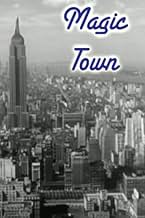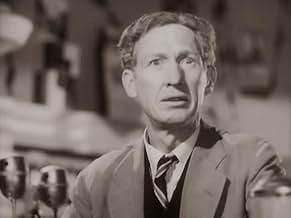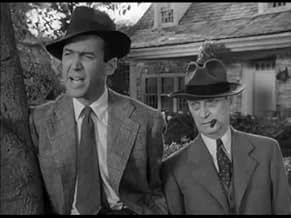NOTE IMDb
6,4/10
1,9 k
MA NOTE
Un sondeur d'opinion trouve une ville qui est un miroir parfait des opinions américaines.Un sondeur d'opinion trouve une ville qui est un miroir parfait des opinions américaines.Un sondeur d'opinion trouve une ville qui est un miroir parfait des opinions américaines.
- Réalisation
- Scénario
- Casting principal
- Récompenses
- 1 victoire au total
Avis à la une
Okay, I'll admit the plot is silly and contrived. Sure, the idea of an actuary determining that there is a "perfect" city that is actually statistically represents America in a microcosm is silly. And, their plan NOT to tell anyone in the town but surreptitiously poll just these townspeople in order to find out what America thinks about a wide variety of issues is far-fetched. BUT, with Jimmy Stewart and Jane Wyman as well as William Wellman's direction, who cares?! This is one of those "just sit back and enjoy" pictures that isn't particularly deep but that is charming and great fun to watch. And I think we need a few films like this now and again.
I have to admit the premise behind Magic Town was a really good and original one. The fact that small time pollster James Stewart discovers a town that is a microcosm of American thinking. What a shortcut, just move in there and poll the citizens on any question. But you have to do it with subterfuge and the town can never have any marked growth of any kind or the goose that's laying Stewart's golden egg is cooked.
Enter Jane Wyman, acting editor of the small town paper who has some ideas about getting the town to grow. That sets up the conflict with Stewart and then the romantic complications set in. Their romance and their differing agendas set the tone for the rest of the film.
I think with a lighter touch this could have been a classic film. It's not a bad film, it's moving in spots, but the subject matter doesn't lend itself to Frank Capra type populism. I'm sure this is a property that Capra himself must have rejected.
Stewart and Wyman are ably supported by the usual group of great character performers that usually populate a Capra film. William Wellman directed this and I think he was out of his element. He's so much better in action films.
It's also so old fashioned in its view of small town America. I can't believe that such a place like Grandview could possibly exist. Think about it, a cross section of America would have its bad people too among the population. Not a bad person in the whole town.
And they even list a U.S. Senator in their population. That would in and of itself make it atypical by his mere presence. In fact when this film was made Harry Truman was president and certainly Independence, Missouri has never been "typical" since he came to political prominence.
My favorite scene is the dance where the whole crowd except the outsider Stewart sing the high school song. It's sung to the tune of I'll Take You Home Again, Kathleen. It's a nice moment and it demonstrates just how alien big city slicker Jimmy Stewart is in this environment. It's good, but it does tip over into the saccharine.
Both Stewart and Wyman have certainly done better, but fans of both these performers will like it. But can you imagine what someone like Preston Sturges would have done with this material?
Enter Jane Wyman, acting editor of the small town paper who has some ideas about getting the town to grow. That sets up the conflict with Stewart and then the romantic complications set in. Their romance and their differing agendas set the tone for the rest of the film.
I think with a lighter touch this could have been a classic film. It's not a bad film, it's moving in spots, but the subject matter doesn't lend itself to Frank Capra type populism. I'm sure this is a property that Capra himself must have rejected.
Stewart and Wyman are ably supported by the usual group of great character performers that usually populate a Capra film. William Wellman directed this and I think he was out of his element. He's so much better in action films.
It's also so old fashioned in its view of small town America. I can't believe that such a place like Grandview could possibly exist. Think about it, a cross section of America would have its bad people too among the population. Not a bad person in the whole town.
And they even list a U.S. Senator in their population. That would in and of itself make it atypical by his mere presence. In fact when this film was made Harry Truman was president and certainly Independence, Missouri has never been "typical" since he came to political prominence.
My favorite scene is the dance where the whole crowd except the outsider Stewart sing the high school song. It's sung to the tune of I'll Take You Home Again, Kathleen. It's a nice moment and it demonstrates just how alien big city slicker Jimmy Stewart is in this environment. It's good, but it does tip over into the saccharine.
Both Stewart and Wyman have certainly done better, but fans of both these performers will like it. But can you imagine what someone like Preston Sturges would have done with this material?
James Stewart stars as Rip Smith, a leading pioneer in the new sciences of public polling and demography. He discovers a small town that serves as a microcosm of the US, with the same percentages of men to women, farmers to shop-keepers, Democrats to Republicans, etc. Etc. This means that Rip and his two associates Ike (Ned Sparks) and Mr. Twiddle (Donald Meek) can survey this one town and get the same results as if they's polled the whole nation, saving companies vast amounts of time and money. However, to keep the townsfolk's answers honest, the trio of newcomers pose as insurance salesmen. Rip also falls for local gal Mary (Jane Wyman), but how will she and the others react when they learn the truth of why Rip's in town?
This was made during a time when the new advances in sociology, group psychology, and by extension Madison Avenue's advertising firms, were thought be on the pulse of the future of the nation. This kind of thinking could make for a thoughtful movie with the right script, but this isn't it. This is a traditional rom-com mixed with lukewarm social commentary and square citizenship lessons. Stewart and Wyman are both fine, as usual, and I liked seeing Ned Sparks, one of the busier character actors of the 1930's, acting wry and cynical again. This would be Sparks last film, as it would be for Harry Holman and Donald Meek, too. Director William Wellman keeps things moving quickly enough, but no one would consider this one of the better films by anyone involved.
This was made during a time when the new advances in sociology, group psychology, and by extension Madison Avenue's advertising firms, were thought be on the pulse of the future of the nation. This kind of thinking could make for a thoughtful movie with the right script, but this isn't it. This is a traditional rom-com mixed with lukewarm social commentary and square citizenship lessons. Stewart and Wyman are both fine, as usual, and I liked seeing Ned Sparks, one of the busier character actors of the 1930's, acting wry and cynical again. This would be Sparks last film, as it would be for Harry Holman and Donald Meek, too. Director William Wellman keeps things moving quickly enough, but no one would consider this one of the better films by anyone involved.
"Magic Town" is a film about something that we nowadays take as normal but which was a novelty in 1947. It was about the new "science" of public opinion polling. This was only understood poorly and not only by the public but by those who actually mattered: the politicians who would grow to need them. In 1936 the Literary Digest, a popular magazine of the day, had conducted a poll of it's membership on who would win the Presidency. It concluded that Governor Alfred Landon of Kansas, a capable man, would beat incumbent President Franklin Roosevelt. Unfortunately the readership of the Digest were upper class, and basically Republican (as Landon was). In November 1936 FDR won one of the biggest landslides in political history, with three quarters of the popular vote and all the electoral votes except for those of Maine and Vermont. Literary Digest went out of business shortly afterwords. In the decade since Roper and Gallup had been improving polling techniques, but the full system was still uncertain. In the 1948 election there would be another polling snafu, with most of the polls awarding the election to Governor Thomas Dewey of New York, as opposed to incumbent President Harry Truman. Harry won a remarkable come-from-behind over Tom, and enjoyed showing off a headline from the Republican "Chicago Tribune" saying that Tom won.
In the midst of all this there was a classic sociology study entitled "Middletown". Set in the typical mid-American town (it was in the Midwest) the authors (a husband and wife team) showed how it's citizens opinions mirrored what mid-America believed. Ten years later the same authors published a follow up study of the town, and it turned there was little change in the opinion differentials between the town and the country.
It is with the "Middletown" study that the background of this film was based. Jimmy Stewart and his assistants (including Ned Sparks and Donald Meek - in his last role) are pollsters, and Stewart has a theory he has been working on that would save pollsters millions. He believes there is a perfect community in the middle of America that can be used for polling it's citizens. He has been studying the problem for several years, and he has found a town where the percentages of the opinions of the citizens perfectly mirror those of the American people as a whole. Stewart goes to the town and sets up there with the intention of using the citizens as his poling guinea pigs, but (as the movie progresses) he gets involved with Jane Wyman and the others in the town. When Wyman discovers Stewart's plans she reveals them, and the town goes crazy. Their sudden unofficial power goes to their heads, and instead of giving the sensible polling answers to questions they give outlandish ones. This causes the crash of their reputation, and the crisis of the film.
It is a first rate film and has some nice touches (including Gabriel Heater intoning on the radio). As an early story regarding the polling industry it is unique, and the film is well acted and directed (by William Wellman). Perhaps not a Capra movie, but it is a nice one all the same.
In the midst of all this there was a classic sociology study entitled "Middletown". Set in the typical mid-American town (it was in the Midwest) the authors (a husband and wife team) showed how it's citizens opinions mirrored what mid-America believed. Ten years later the same authors published a follow up study of the town, and it turned there was little change in the opinion differentials between the town and the country.
It is with the "Middletown" study that the background of this film was based. Jimmy Stewart and his assistants (including Ned Sparks and Donald Meek - in his last role) are pollsters, and Stewart has a theory he has been working on that would save pollsters millions. He believes there is a perfect community in the middle of America that can be used for polling it's citizens. He has been studying the problem for several years, and he has found a town where the percentages of the opinions of the citizens perfectly mirror those of the American people as a whole. Stewart goes to the town and sets up there with the intention of using the citizens as his poling guinea pigs, but (as the movie progresses) he gets involved with Jane Wyman and the others in the town. When Wyman discovers Stewart's plans she reveals them, and the town goes crazy. Their sudden unofficial power goes to their heads, and instead of giving the sensible polling answers to questions they give outlandish ones. This causes the crash of their reputation, and the crisis of the film.
It is a first rate film and has some nice touches (including Gabriel Heater intoning on the radio). As an early story regarding the polling industry it is unique, and the film is well acted and directed (by William Wellman). Perhaps not a Capra movie, but it is a nice one all the same.
A year before this film came out there were major news stories about a `perfect American city,' but once the story broke
so did the illusion. People had to learn the perfect society has to be practiced individually, intentionally and daily for it to become a reality.
I just re-watched this film again today and was very entertained by James Stewart (winking and charming) and Jane Wyman (smart and sexy). Packed with the Robert Riskin type characters this story lacks the `real' message of his earlier films and there in lies it's only weakness. It's a fun trip but after we've gone in circles for a while we are reminded there is no place like home. Still this film has lots of treasures in the performances, dialogue, physical comedy and rich diversity home spun Americana characters. I recommend this to all fans of the Capra-Riskin genre.
P.S. It's also your last chance to enjoy the work of Ned Sparks & Donald Meek who both died after completing this minor masterpiece of Riskin-corn.
I just re-watched this film again today and was very entertained by James Stewart (winking and charming) and Jane Wyman (smart and sexy). Packed with the Robert Riskin type characters this story lacks the `real' message of his earlier films and there in lies it's only weakness. It's a fun trip but after we've gone in circles for a while we are reminded there is no place like home. Still this film has lots of treasures in the performances, dialogue, physical comedy and rich diversity home spun Americana characters. I recommend this to all fans of the Capra-Riskin genre.
P.S. It's also your last chance to enjoy the work of Ned Sparks & Donald Meek who both died after completing this minor masterpiece of Riskin-corn.
Le saviez-vous
- GaffesAt the soda fountain, between shots, the drinks are full, then half empty, then full again.
- Citations
Mary Peterman: The air becomes charged with electricity around desperate men.
- Versions alternativesAlso available in a colorized version.
Meilleurs choix
Connectez-vous pour évaluer et suivre la liste de favoris afin de recevoir des recommandations personnalisées
- How long is Magic Town?Alimenté par Alexa
Détails
- Durée1 heure 43 minutes
- Couleur
- Rapport de forme
- 1.37 : 1
Contribuer à cette page
Suggérer une modification ou ajouter du contenu manquant

Lacune principale
By what name was La cité magique (1947) officially released in India in English?
Répondre




































